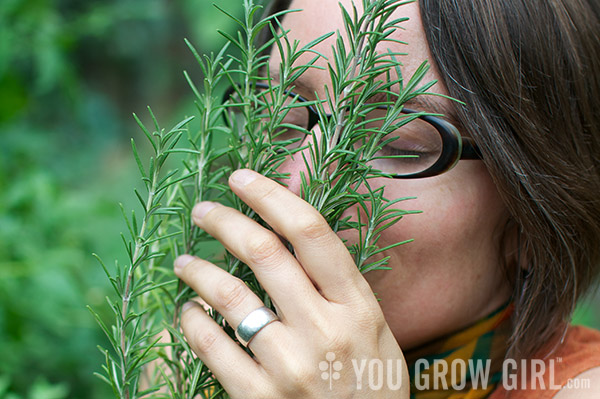
Many years ago, not long after gardening came to me* and stuck, I read a statistic that said something to the effect that just looking at a plant lowers our heart rate. This was so long ago now that I no longer recall the exact phrasing, nor where I read it, or why. Regardless, it was the first time I made a concrete, conscious connection between the act of gardening and the ways in which it could and did benefit me, the gardener.
Years later, and countless hours spent in various gardens of my making, I have never bothered to look further into current research for examples of how gardening may be enhancing my health, brain, body, and overall wellbeing. I just know intuitively that it is, and that’s really all of the proof that I need. However, as my relationship to gardening has evolved and grown, so have the benefits that I have felt and acknowledged. I suspect that with time, I will become aware of and experience new benefits. For now, the following is a brief musing on the gains I have gleaned so far:
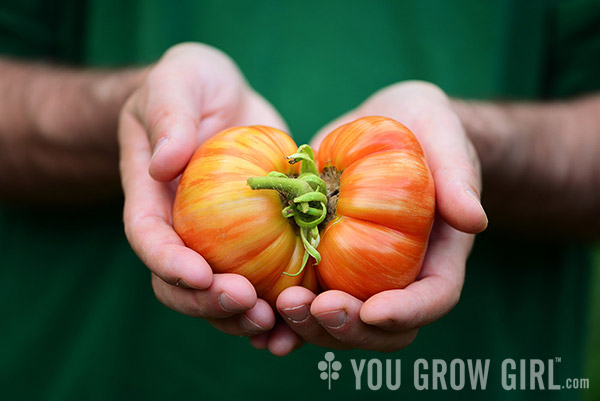
On Growing Food
Growing food transforms us into producers — something we desperately need in a passive consumer culture where we have become an audience watching life rather than producers making it. Growing food provides a connection to and an understanding of where our food comes from. It schools us in what food looks like when it comes out of the ground or off of the vine, with all of its shapes, flaws, beauty, and flavor. The work involved in growing our own food provides first-hand knowledge of the labour that goes into growing it and teaches us not to take it or the work that farmers do for granted. It transforms our expectations and turns us into educated consumers who know the value of good, well-grown produce. It challenges us not to accept lesser quality food and lesser quality growing practices. Growing food makes us stronger and more resilient. It gives us pride of self-relience. It satiates the worry that should the Zombie Apocalypse come, we may just be able to make it out alive.
In growing countless plants and learning about their biology I have come to the knowledge that as food, plants are not benign. Every plant can have some action on the body, and in turn, eating is medicine.
On Creativity
We all come to gardening for different reasons, and while the topic is most often plunked in with and categorized as style and design, it doesn’t have to be about either. Much of my own gardening practice is about food production, using plant materials for dyes and other purposes, and feeding pollinators, all of which favour conditions that can sometimes work against aesthetic appeal, at least in the most culturally acceptable forms. However, I think that creativity comes down to self-expression and and a heightened awareness or way of experiencing that can be found and nurtured in unlikely ways. The more mundane aspects of gardening can be creative acts, even when our attentions are not drawn to cultivating a particular aesthetic. I also find that the plants themselves can inspire creativity and that as we live with them, we can’t help but begin to look at them more closely. Looking gives way to seeing, and seeing alters the way we perceive the world as a whole, which is in itself a form of creativity.
On Being More Aware
It’s hard not to notice the processes and cycles of things when we’re firmly embedded within them. Being a gardener has caused me to noticed weather patterns and how the climate shifts and changes from year to year. I quickly gave up the false notion that gardening is a single, repeated act and that every year is predictable and the same. Within that I also started to understand which patterns could be expected and what it means when they shift. That alone has changed how I think about and respond to climate change.
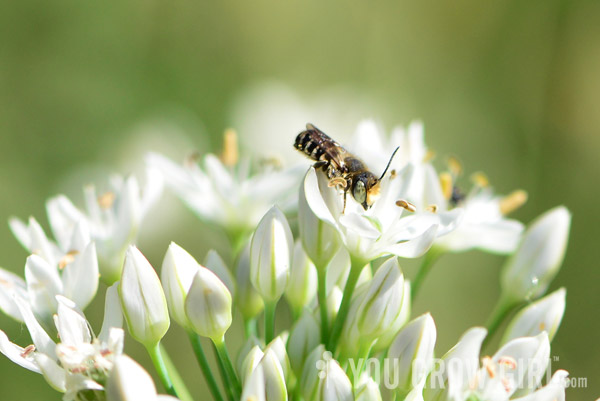
On Connecting to the Earth
I didn’t start gardening for political or environmental reasons, but along the way, gardening has pushed me to reconsider my place in the world and the effect of my actions therein. In the beginning, most of the positive choices I made, whether to avoid using pesticides or plant a drought tolerant perennial, were made passively — I didn’t want to touch chemicals and I probably thought the flowers were pretty. How I made my choices as a gardener were a reflection of the passive choices I made in other areas of my life: using Mr. Clean to wash the floor because everybody else did, and eating unhealthy foods because that’s just how I was raised. But slowly, with time and experience I began to see little ecosystems form around specific plants. I saw insects and other living things I had never noticed before, and in seeing, I became aware of their interconnectedness. I started to perceive them — all of them — as a necessity instead of a nuisance. I came to understand the meaning of the phrase, “everything is everything.” Everything I do counts. I saw first-hand that using a spray, even an organic one, came with potential side effects to the little ecosystems I was creating. I dropped even the homemade, organic sprays when my appreciation and respect for life in the garden became more important than the so-called war I was in with the “bad” insects. And then I started to consciously change the language I used to reflect that change. I’m still working on it. The us versus them war paradigm is strong in our culture and can be a difficult mindset to drop.
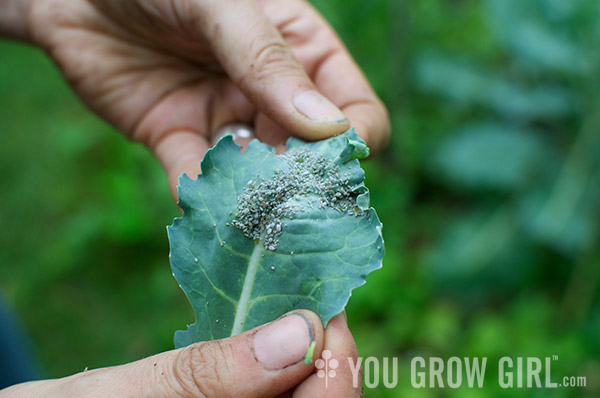
Over the years there was loss in the garden. Unpredictable events happened that were beyond my control. I sometimes wonder if the interplay of life and death in the garden acts as a safe, less painful precursor to the ultimate losses we will experience elsewhere in our lives. What I know for certain is that these experiences have put me closer in touch with my own need for control and my resistance to my own vulnerability. Things fall apart. My life will end and all of this will still be here when I am gone. With that realization comes a heightened sense of responsibility for and to this little patch of land that I cultivate as it connects to the greater patch of land that is the earth. I have a shared, collective stewardship to my surroundings that reaches beyond the here and now. What I do here can’t be just about my own ego and personal desires.
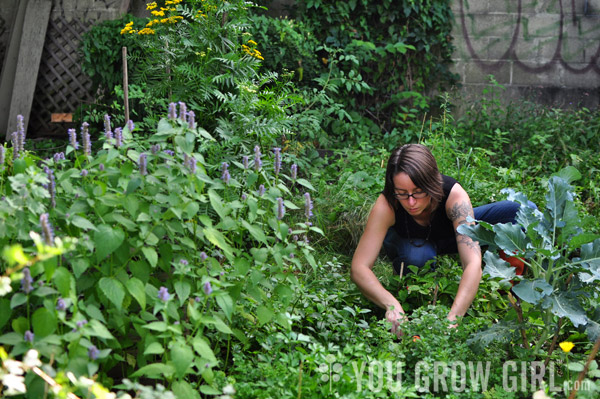
On Connecting to the Child Brain and Self
Gardening is work and play combined. It reconnected me to the visceral pleasure in getting my hands dirty and gave me the permission to indulge it. It brought me back to the child-like sense of wonder and discovery about the world that I had bottled up deep in childhood memory and put away for the sophistication and “maturity” of adult life. Gardening brought back the utter delight and surprise in finding a worm poking its squirmy body up through the soil and rekindled the magic I once felt in planting a seed in a cup and watching it sprout. Without knowing it, the garden became my teacher, classroom, and playground all rolled into one.
Somehow, despite my resistance, the garden is continuously working to usher forth my maturation. It always seems to teach me exactly what I need to learn, exactly when I need it. Its struggles and accomplishments show me who I am and what I am made of. It is a place where I can just BE and allow the weight of the world to dislodge from my body, right down to my bones. No matter what goes on in my life and no matter how off-balanced and alienated I may feel, stepping into the garden brings me back to centre, back to myself, and back to that sense of connectedness to nature, the processes of life, and the greater world beyond that we all have inside of us.
I wasn’t looking for it or asking for it, but gardening reconnected me to a part of my being that I didn’t know was lost. And every time I smell the first tomato of summer or gently pat the earth down around the roots of a newly planted seedling, it brings it back over and over again so I can never again forget, never again disconnect.
What has gardening done for you? How has it changed and shaped you?
———————–
* This phrasing came to me, in part, from an article I read a short while ago about chronic illness called, Sick Woman Theory by Johanna Hedva. In it she mentions that in the Native American Cree language, one does not say, “I am sick.” Instead, the phrasing is, “sickness has come to me.” In a way, this is how I see gardening. For many years I gardened in small doses, starting and stopping for various reasons before I finally stopped stopping. In that way it wasn’t a choice so much as something that came into my being and became a part of me.
Thanks for sharing your thoughts on this. I’ve been gardening and growing food on and off for a lot of my life, and it’s definitely opened my eyes and expanded my horizons. Like you, I feel connected to the things I grow and thankful for the bounty and humbled by the failures. I hope I’ve learned along the way – in my first garden, I didn’t think about soil and I didn’t understand the flowers on my basil plants that seemed to kill them! Now we’re building a raised bed and creating our own soil mix and I’m excited to plant things I haven’t grown before (and to show my kids where food actually comes from).
It hit me like a ton of bricks when the weather warmed this week. I rushed to plant peas and fava beans and feel like a new person already. I like the break I get in winter–or I tell myself I do–but as soon as I have the opportunity to garden again, I feel like I am me again, home again, and on and on. Everything Is Everything!
Gardening is all the same things to me that it is to you….but it also connects me with my family and heritage — my people are gardeners, ranchers, farmers. My mother was the leader of her garden club when I was little, my grandmother and and my great-grandmother once won awards for their beautiful garden in Central Montana. These generations have passed on, but with my parents, the garden can, at times, be something to discuss when other things are perhaps a bit more difficult. My other grandmother sent an amaryllis to my daughter to grow along with her and her other great grand daughter… so that all three had blooms at the same time in January in different parts of the country. And with these same grandparents that I think it is between the garden and the ‘shop’ that keeps them in their home as long as they have stayed, and it is is these things that will be the most devastating to loose as the consider moving to a place that is easier to manage.
Wow! What a very well written article that reminds me why I started my little garden and keeps inspired to spend more time in it. I have the first strawberries of the season starting to ripen now and it actually excites me because I made them, and boy will I enjoy them (slowly because there’s only a few…)
You expressed that ‘Sense of connectedness’ beautifully. Thanks for sharing!
Beautifully written and speaks to my heart. Thank you for sharing it with us-
Gardening connects me to the world in a way that nothing else does. I get tremendous satisfaction from growing my own food, from playing around and experimenting. Even the more mundane chores give me a satisfaction that, for me, just doesn’t come from other kinds of work.
Gardening reminds me that winter leaves room to spring no matter what, and that life always finds its way.
And plants heal! Thank you for putting into words to some of the many benefits of gardening. As an organic gardener (flowers, herbs & food) for 35 years, I thought the folks following this blog would appreciate, as I do, the work of Alma R. Hutchens, whose book, Indian Herbalogy of North America (1969, 1991), is encyclopedic and a trusted resource with excellent drawings and medical references–an entire new vocabulary that illustrates the healing powers of plants, and the knowledge of ancient herbal healers. Do read the front material!
To garden is to learn to listen and observe, and let the plants teach. Gardening is an active meditation, and has been for thousands of years. I have come to respect the gardeners who’ve come before us, ever more deeply as I continue to actively learn about and from plants, pollinators, worms, and of course sunlight, soil, and seed!
My most recent use of Hutchens’ book was my best resource for rapidly curing a painful “stone.” I knew if I researched from her book, that I could find in my yard and gardens what I would need to eliminate it, though I’d never experienced one before. Just 2 of her suggested dozen plant cures, parsley and birch bark were the most available to me. I also had some “Gravel Root” (aka: Purple Boneset/Joe Pye Weed) tincture which I added to my DeTox tea. Onset to relief was only 8 hours of flooding with these healing herbs. I’ve used her book to heal my animals, myself, and friends. Thank you again for a wonderful meditation on gardening!
Thank you for sharing your thoughts about gardening. I have enjoyed your writing since Margaret Roach mentioned you in her “A Way to Garden”. I had gardened for most of my life; however, surviving a malignant melanoma in my eye renewed and enhanced my appreciation for nature; especially for gardening.
God bless you, Gayla.
A beautifully crafted and written post. The “On Creativity” section especially rang true for me, a person who once spent too much time worrying about how my garden looked and not enough time appreciating its companionship.
Gardening has helped me grow more than plants. It has taught me to grow my patience.
Thank you for that enchanting bee photo interspersed among your wise words. I am so uplifted to see how your fans have chimed in here. I see many of my “spiritual twins” in these reflections and feel part of a tall, arching, positive wave riding the tide of spring.
Gardening has brought me so many rewards. It is a driving force 12 months of the year, merely moving inside when the landscape goes dormant in winter. None of it feels like work; it all feels like adventure and contentment.
Once a visitor I did not know well came through my gate, looked around with great interest and said, “You must be very close to God here.” I was dumbstruck by that remark. It resonated within. A few years later, another woman visitor told my husband, “Your wife is really connected to the earth, isn’t she?” Both of these compliments are etched in my memory. I feel blessed to call myself a gardener.
“To create a little flower is the labor of ages.” William Blake
I am return gardner. I have quit work and am looking forward to getting into nature in my small garden. Am looking for friends a long this journey
I use gardening techniques in my work with students. Yesterday I had two students who recently moved, neither by choice and both were showing signs of upheaval and unhappiness.
We transplanted my heirloom tomato seedlings into their discarded milk containers from their lunch. And, naturally, right afterward their seedlings wilted. I explained the tomatoes were suffering from being uprooted and moved but with a little care and water they would bounce back and be fine.
I had the students carefully move them to a semi-sunny spot outside so they wouldn’t suffer from too much sun (they had been kept exclusively inside prior to this) and showed them how to give them just a little water. The one boy decided to give his tomato a “pep talk.” Sure enough, within a few minutes of receiving this “love and attention” their tomatoes pepped right up and were showing signs of recovery.
The students immediately made the connection to their own lives and their smiles were the reassurance I needed and hoped to receive. Possibly I planted a gardening seed in them, but more importantly they have a little hope their lives will settle down and they too will thrive in their new environment. And, for the record, they are in high school – not little kids at all and just a reminder that just because they have big bodies doesn’t mean they don’t need reassurance and special care at difficult times.
I love what you did here. A great example of using gardening to teach by example compassion, nurturing, and self care.
I just stumbled upon your blog and love it! Since the weather became warmer this month, I’ve been outside regularly, cleaning up the old plant debris and getting myself into quite a large project of digging out two new flower beds in the lawn and prepping them for seeds! I could spend hours and hours outside, taking in the sun, the smells, pondering… and getting a great workout with a shovel.
Love this article about the benefits of gardening. Thank you so much!
I have been an enthusiastic gardener for many years now. It started as a hobby and it turned into a full time job, I love gardening and spend many hours preparing my garden. Up until this point and reading this article I never really considered the health benefits. So thank you for bringing this to my attention.
Hi Gayla,
I found your lovely designed website and would like to leave a comment. I love to be in my garden… especially in spring, when everything starts to bloom. There I can relax and recharge power. Looking forword to read more from you.
Greetings from a german garden lover,
Andreas